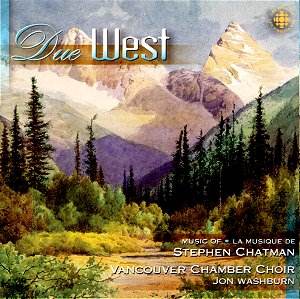Stephen CHATMAN
Choral Music
 Linda Lee Thomas (piano)
Linda Lee Thomas (piano)
Roger Cole (oboe)
Vancouver Chamber Choir/Jon Washburn
rec 26-29 Oct 1999
 CBC RECORDS MVCD
1132
[71.14]
CBC RECORDS MVCD
1132
[71.14]
Amazon
US

Due West (1997)
Thou whose harmony is the music (1994)
Two Rossetti Songs (1999)
Rose-cheek'd Laura (1998)
Dryads' Bells (1998)
An Elizabethan Summer (1989)
Blow Blow Thou Winter Wind (1991)
Five Canadian Folk Songs (1996)
Lux Aeterna (1999)
Gloria (1997)
In Flanders Fields (1998)
In the Glow of the Moon (1992)
Songs of a Prospector (1988)
This CD arrived during a day off work. Accordingly I had the leisure and
pleasure of hearing Stephen Chapman's music for the first time.
Although all this music was written during the 1980s and 1990s it should
hold no fears for traditionalists. It is all determinedly tonal. If you have
a taste for Stanford's Bluebird, for Herbert Howells' choral music
(although Chapman is rarely as harmonically dense as the most complex of
Howells' pieces) or Percy Grainger then you will instantly warm to these
tracks.
Due West, Dryads' bells and Songs of a Prospector are
sheer fun. Many of the songs sidle darn close to Barber shop close harmony
and none the worse for that. Due West is alive with onomatopoeic effects:
railroad wailing, wasps buzzing, the climactic 'ouch' of the wasp that found
its mark and 'chickadee' zipping. This is contrasted with the light-infused
Prairie Lullaby and Sunset.
The choir is in great form. Their sensitive and stepped control of dynamics
in the three Elizabethan settings is remarkable. They are perhaps a bit
self-consciously 'anciente' but you might easily say the same of aspects
of Warlock's and Gurney's settings.
Blow Blow Thou Winter Wind the choir is joined by the rippling
Rachmaninovian piano. Geoffrey Bush is also recalled from time to time. I
thought about his Summer Serenade during the Two Rossetti settings,
one with a Howellsian climax; the other akin to the Londonderry Air.
This set me up nicely for the mellifluous fluency of the invocation to Rose
Cheek'd Laura.
The Five Canadian Folksongs each represent a province. The Québecois
song is quite aptly redolent of Canteloube's Chant de L'Auvergne.
O Prairie Land sounds like a national anthem with its roots struck
deep into O Tannenbaum. The flighty jaunty jollity of Lukey's Boat
is preceded by the lovely She's like the swallow.
Then follows two parts of the Latin Mass/Requiem which achieve their effect
through rocking repetition - quite mesmerising in fact.
In Flanders Fields does not set the poem by Ivor Gurney (whose title is slightly
different anyway!) but those of another WW1 poet, the Canadian John McCrae.
The words will in their own way give you some idea of the music which partners
the word with a gentle fidelity:-
We are the Dead. Short days ago
We lived, felt dawn, saw sunset glow.
Loved and were loved, and now we lie,
In Flanders fields.
It is then a natural progression into In the Glow of the Moon for
women's voices and piano. It has a breathless romantic glow and a coruscating
piano part.
Notes and full texts are printed in the leaflet.
This is music that is a pleasure to listen to and unlike much modern choral
music avoids being forbidding at one extreme or bland at the other.
Mr Chatman is regally well served by the Vancouver Chamber Choir who deserve
a glowing international reputation.
I shall hope to hear these freshly inventive settings in future choral programmes
and especially in Choir of the Year competitions.
I shall also hope to hear Chatman's orchestral music. On this showing it
is an exciting prospect.
Rob Barnett

